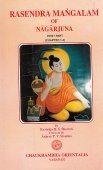Rasaratnakara, Rasaratnākara, Rasa-ratnakara: 4 definitions
Introduction:
Rasaratnakara means something in Hinduism, Sanskrit. If you want to know the exact meaning, history, etymology or English translation of this term then check out the descriptions on this page. Add your comment or reference to a book if you want to contribute to this summary article.
In Hinduism
Ayurveda (science of life)
Rasashastra (Alchemy and Herbo-Mineral preparations)
Source: History of Science in South Asia: Making Gems in Indian Alchemical LiteratureRasaratnākara (रसरत्नाकर) (lit. “jewel mine of mercury”) is the name of a 13th century alchemical work in Sanskrit written by Nityanātha.—The Rasaratnākara describes the practice of producing gems in the context of the Indian alchemical tradition (rasaśāstra, rasavāda or rasavidyā) which has only few references to it found in its literature. The work is one of the key works of the Indian alchemical discipline and draws heavily on earlier alchemical works (such as the 10th-century Rasahṛdayatantra by Govinda, etc.).
The Rasaratnākara consists of five parts (khaṇḍas):
- The section dedicated to mercury (rasakhaṇḍa),
- The section dedicated to the lord of essences, i.e., mercury (rasendrakhaṇḍa),
- The section dedicated to the doctrine (vādakhaṇḍa),
- The section dedicated to elixirs and tonics (rasāyanakhaṇḍa),
- The section dedicated to utterances of power (mantrakhaṇḍa).

Āyurveda (आयुर्वेद, ayurveda) is a branch of Indian science dealing with medicine, herbalism, taxology, anatomy, surgery, alchemy and related topics. Traditional practice of Āyurveda in ancient India dates back to at least the first millenium BC. Literature is commonly written in Sanskrit using various poetic metres.
Languages of India and abroad
Sanskrit dictionary
Source: Cologne Digital Sanskrit Dictionaries: Aufrecht Catalogus Catalogorum1) Rasaratnākara (रसरत्नाकर) as mentioned in Aufrecht’s Catalogus Catalogorum:—alaṃk. B. 3, 56. Quoted by Mallinātha on Kirātārjunīya 9, 71, and on Meghadūta Oxf. 126^a.
—[commentary] by Hṛdayarāma Miśra. Ben. 35.
2) Rasaratnākara (रसरत्नाकर):—med. in form of an extract from a tantra. Bik. 655. Kāṭm. 13. Rādh. 32.
—from the Rudrayāmala. Peters. 2, 197.
—by Ādinātha (?). Np. Vii, 40.
—by Nityanātha Siddha. W. p. 297 ([fragmentary]). K. 216 (also Rasaratnamālā). B. 4, 236. Bik. 656. NW. 246. [Oudh 1876-1877], 32. Vii, 6. Np. I, 18. Iii, 52. V, 32. Poona. 182. Taylor. 1, 1. Oppert. 1022. 2980. 4041. 8205. Ii, 3246. 3315. 6596. Rice. 294 (by Revaṇasiddha). Peters. 3, 399 ([fragmentary]). Rasaratnākare Dehasiddhisādhana. K. 212.
—Mantrakhaṇḍa. Kh. 76.
3) Rasaratnākara (रसरत्नाकर):—med. by Śukrapāṇi. K. 216.
4) Rasaratnākara (रसरत्नाकर):—med. by Nāgārjuna. Stein 187.
5) Rasaratnākara (रसरत्नाकर):—med. in five khaṇḍa (Rasakhaṇḍa, Rasendrakhaṇḍa, Vādakhaṇḍa, Rasāyanakhaṇḍa, Siddhakhaṇḍa). by Nityanātha Siddha. [Bhau Dāji Memorial] 59. Bl. 237-39. Gov. Or. Libr. Madras 74. Peters. 4, 40. Rgb. 937. Stein 187. 188. Quoted by Vaidyarāja in Sukhabodha, Catal. Io. 943.
6) Rasaratnākara (रसरत्नाकर):—med. by Nityanātha Siddha, son of Śaṅkhagupta. Ulwar 1665.
—the mantra section, by the same. Ulwar 2308.
7) Rasaratnākara (रसरत्नाकर):—med. Bd. 924.
—by Nityanātha Siddha. Ak 941. 942 (Mantrakhaṇḍa inc.). As p. 160 (2 Mss.). Bd. 908 (Upadeśa 1). Hpr. 1, 308 (Mantrakhaṇḍa). Hz. 1119 (dto). L.. 1217 (Upadeśa 3-5 and part of 6). Peters. 5, 543. 544.
Rasaratnākara (रसरत्नाकर):—[=rasa-ratnākara] [from rasa-ratna > rasa > ras] m. Name of [work]
[Sanskrit to German]
Sanskrit, also spelled संस्कृतम् (saṃskṛtam), is an ancient language of India commonly seen as the grandmother of the Indo-European language family (even English!). Closely allied with Prakrit and Pali, Sanskrit is more exhaustive in both grammar and terms and has the most extensive collection of literature in the world, greatly surpassing its sister-languages Greek and Latin.
See also (Relevant definitions)
Partial matches: Rasa, Ratnakara, Raca.
Full-text (+130): Nityanatha, Mutratisara, Drakshaghrita, Dadhimanda, Trailokyasundara, Nayikacurna, Pashanavajrakarasa, Purnendurasa, Paniyakumararasa, Trivikramadeva, Navayasa, Punarnavamandura, Proshthika, Nityanandarasa, Trigunakhya, Pratyangira, Pancasya, Pancavalkala, Nagahva, Pranatranarasa.
Relevant text
Search found 5 books and stories containing Rasaratnakara, Rasaratnākara, Rasa-ratnakara, Rasa-ratnākara; (plurals include: Rasaratnakaras, Rasaratnākaras, ratnakaras, ratnākaras). You can also click to the full overview containing English textual excerpts. Below are direct links for the most relevant articles:
Rasa Jala Nidhi, vol 5: Treatment of various afflictions (by Bhudeb Mookerjee)
Part 14 - Chemists of the Metallic School: Shambhu < [A Brief History of Indian Chemistry and Medicine]
Part 9 - Chemists of the Metallic School: Kapali, author of Rasa-raja-mahodadhi < [A Brief History of Indian Chemistry and Medicine]
Part 13 - Chemists of the Metallic School: Ratnakosha < [A Brief History of Indian Chemistry and Medicine]
Atharvaveda and Charaka Samhita (by Laxmi Maji)
Rasaratnākara (Āyurveda book) < [Chapter 1 - Introduction]
Review of the Literature < [Chapter 1 - Introduction]
Cosmetics, Costumes and Ornaments in Ancient India (by Remadevi. O.)
1.5. Use of Kuṅkuma (Saffron) < [Chapter 1 - Cosmetics]
1.3. Use of Madayantikā (Henna) < [Chapter 1 - Cosmetics]
10. Business and Trade of Cosmetics < [Chapter 1 - Cosmetics]
Maha Prajnaparamita Sastra (by Gelongma Karma Migme Chödrön)
Tenth comparison or upamāna: A metamorphosis (nirmāṇa) < [Bodhisattva quality 19: the ten upamānas]
A History of Indian Philosophy Volume 2 (by Surendranath Dasgupta)
Part 18 - Āyurveda Literature < [Chapter XIII - Speculations in the Medical Schools]
Related products

